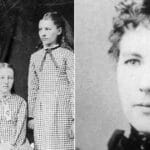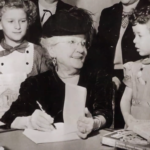Carrie Ingalls Swanzey, the younger sister of Laura Ingalls Wilder, forged her own path as a successful journalist and landowner in the Black Hills, leaving a legacy beyond the pages of Little House. Born amidst the backdrop of Little House on the Prairie, Carrie Ingalls’s life unfolded from frontier childhood to a career in print media, showcasing resilience and adaptability in a changing world. This article delves into the untold story of Carrie, exploring her remarkable journey from prairie travels to becoming a prominent figure in the Black Hills community.
From Prairie Child to Pioneer Woman
Carrie Ingalls, born on August 3, 1870, in Montgomery County, Kansas, entered a world defined by the hardships and adventures of pioneer life. As the third daughter of Charles and Caroline Ingalls, and younger sister to Laura Ingalls Wilder, Mary Ingalls, and Grace Ingalls, she shared the experiences so vividly depicted in the Little House books. These early years, marked by constant moves and the precarious nature of frontier living, likely instilled in her a deep sense of resilience and adaptability. From the sweeping plains of Kansas to the burgeoning town of De Smet, South Dakota, Carrie’s childhood was a tapestry woven with both struggle and simple joys. These formative experiences undoubtedly shaped the woman she would become, laying the foundation for a life marked by independence and determination.
The Ink-Stained Legacy: A Woman of the Press
While Laura pursued her passion for writing fiction, Carrie found her calling in the world of journalism. This path, far from the traditional domestic roles often associated with women of that era, speaks volumes about her independent spirit and ambition. Starting as a typesetter, she immersed herself in the bustling world of newspapers, likely captivated by the clatter of the printing press and the power of the written word. From De Smet to the rugged beauty of the Black Hills, Carrie honed her skills, working for various newspapers, including the De Smet News and the Keystone Recorder. She steadily climbed the ranks in a male-dominated field, eventually achieving the remarkable feat of becoming a newspaper owner and publisher. Through her work, Carrie captured the stories and spirit of the Black Hills pioneer era, giving voice to her community and documenting a crucial period in local history. What insights did her editorials offer into the social and political climate of the time? What stories did she choose to highlight, and how did her perspective shape the narrative of her community? These are questions worth exploring to gain a deeper understanding of Carrie’s contribution to the historical record.
Life in the Black Hills: Love, Loss, and Community
Marrying later in life, Carrie Ingalls Swanzey found love and partnership with David N. Swanzey, establishing a home and contributing to the vibrant community of the Black Hills. In 1912, at the age of 41 (some sources say 42), Carrie married David, a widower with two children, Mary and Harold. This union brought with it not only companionship but also the joys and challenges of stepmotherhood. Carrie embraced this new role, nurturing her stepchildren and creating a family rooted in love and commitment. Their life together in Keystone and later Rapid City, placed Carrie at the heart of a burgeoning community in the Black Hills. David, interestingly, had connections to the naming of Mount Rushmore, adding another layer of historical significance to Carrie’s story. Tragically, Carrie and David experienced the devastating loss of Harold, followed by David’s passing in the same year. Despite these heartbreaks, Carrie persevered, demonstrating the resilience that had been forged in her early pioneer years.
Carrie’s Enduring Legacy
Carrie Ingalls Swanzey’s story is a testament to the power of individual narratives, reminding us that history is made up of not just grand events, but also the quiet triumphs and struggles of ordinary people. Her journey from prairie child to accomplished journalist challenges our preconceived notions about women’s roles in the late 19th and early 20th centuries. Carrie’s legacy extends beyond the shadow of her famous sister, offering a unique perspective on pioneer life, the evolving role of women in society, and the importance of community. While much of her personal life remains to be uncovered, ongoing research into local archives and family histories may yet reveal more details about her thoughts, opinions, and the impact she had on her community.
Want to explore other fascinating figures? Discover the story of Chuck Panozzo Styx and his enduring musical legacy. Learn about the impressive career of Gloria Allred Net Worth and her impactful legal work. Or delve into the world of automotive artistry and explore the remarkable Horacio Pagani Net Worth, the visionary behind some of the world’s most exclusive supercars.
- Discover Famous French Women: A History of Impact - April 2, 2025
- 2025 World Map: Unveiling Geopolitical Shifts & Risks - April 2, 2025
- Secure Your Future: Living Will vs. Last Will Guide - April 2, 2025















